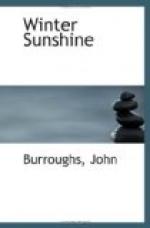A fire, of course,—an encampment in the woods at this season without a fire would be like leaving Hamlet out of the play. A smoke is your standard, your flag; it defines and locates your camp at once; you are an interloper until you have made a fire; then you take possession; then the trees and rocks seem to look upon you more kindly, and you look more kindly upon them. As one opens his budget, so he opens his heart by a fire. Already something has gone out from you, and comes back as a faint reminiscence and home feeling in the air and place. One looks out upon the crow or the buzzard that sails by as from his own fireside. It is not I that am a wanderer and a stranger now; it is the crow and the buzzard. The chickadees were silent at first, but now they approach by little journeys, as if to make our acquaintance. The nuthatches, also, cry “Yank! yank!” in no inhospitable tones; and those purple finches there in the cedars,—are they not stealing our berries?
How one lingers about a fire under such circumstances, loath to leave it, poking up the sticks, throwing in the burnt ends, adding another branch and yet another, and looking back as he turns to go to catch one more glimpse of the smoke going up through the trees! I reckon it is some remnant of the primitive man, which we all carry about with us. He has not yet forgotten his wild, free life, his arboreal habitations, and the sweet-bitter times he had in those long-gone ages. With me, he wakes up directly at the smell of smoke, of burning branches in the open air; and all his old love of fire and his dependence upon it, in the camp or the cave, come freshly to mind.
On resuming our march, we filed off along a charming wood-path,—a regular little tunnel through the dense pines, carpeted with silence, and allowing us to look nearly the whole length of it through its soft green twilight out into the open sunshine of the fields beyond. A pine wood in Maryland or in Virginia is quite a different thing from a pine wood in Maine or Minnesota,—the difference, in fact, between yellow pine and white. The former, as it grows hereabout, is short and scrubby, with branches nearly to the ground, and looks like the dwindling remnant of a greater race.
Beyond the woods, the path led us by a colored man’s habitation,—a little, low frame house, on a knoll, surrounded by the quaint devices and rude makeshifts of these quaint and rude people. A few poles stuck in the ground, clapboarded with cedar-boughs and cornstalks, and supporting a roof of the same, gave shelter to a rickety one-horse wagon and some farm implements. Near this there was a large, compact tent, made entirely of cornstalks, with, for door, a bundle of the same, in the dry, warm, nest-like interior of which the husking of the corn crop seemed to have taken place. A few rods farther on, we passed through another humble dooryard, musical with dogs and dusky with children. We crossed here the outlying fields of a large, thrifty, well-kept-looking farm with a showy, highly ornamental frame house in the centre. There was even a park with deer, and among the gayly painted outbuildings I noticed a fancy dovecote, with an immense flock of doves circling aboxe it; some whiskey-dealer from the city, we were told, trying to take the poison out of his money by agriculture.




